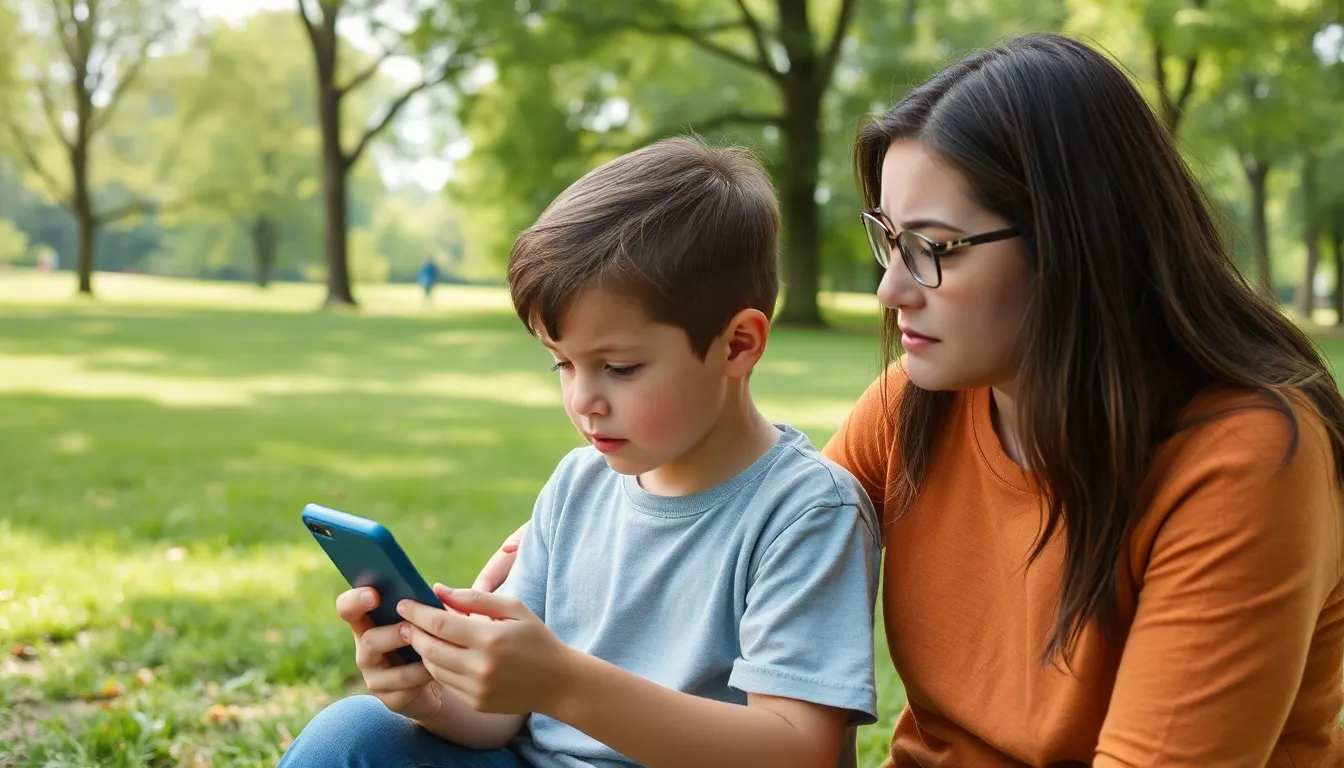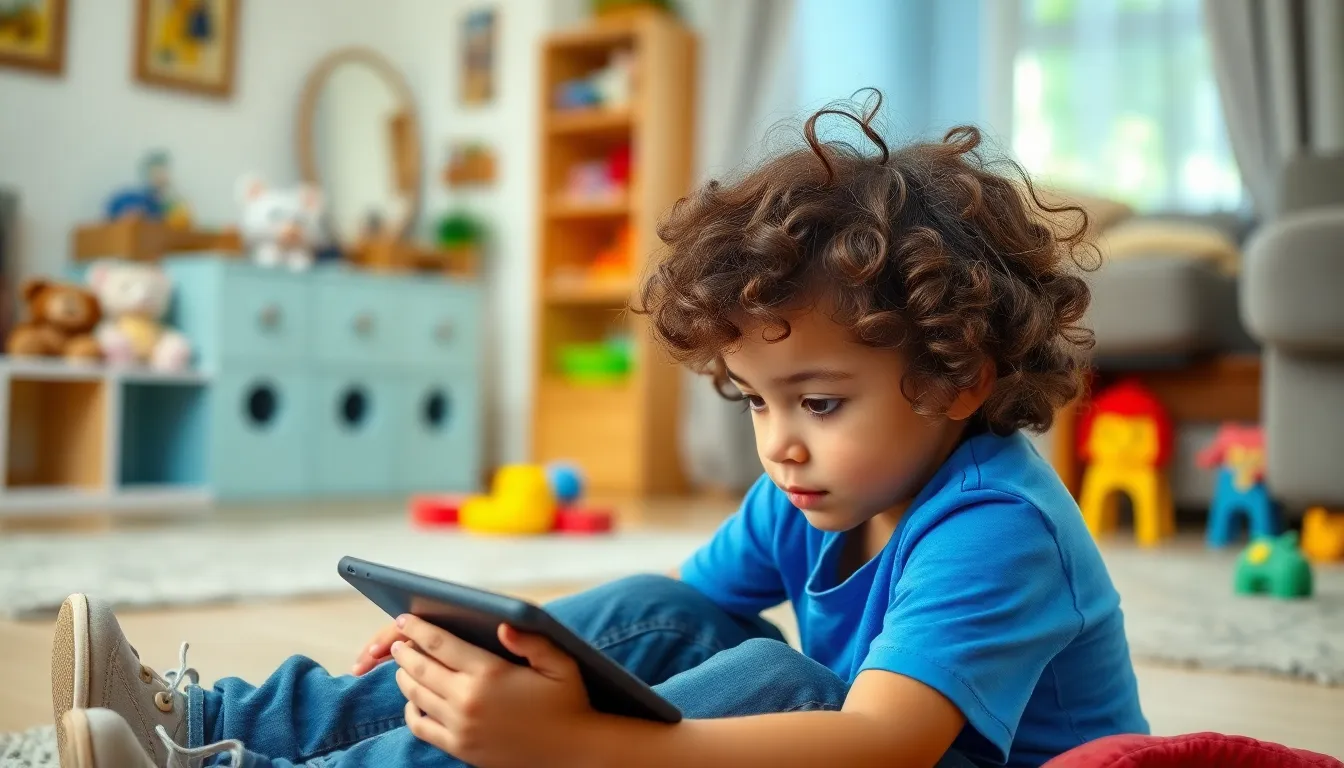In a world where kids seem glued to their screens like they’re auditioning for a tech-themed superhero movie, the question looms large: is too much screen time really bad for them? With tablets, smartphones, and TVs vying for their attention, it’s no wonder parents feel like they’re competing against an army of pixels.
While technology can be a fantastic tool for learning and creativity, it can also turn little ones into couch potatoes faster than you can say “screen time limits.” As parents navigate this digital minefield, understanding the potential pitfalls of excessive screen time becomes crucial. Are those endless hours of gaming and binge-watching leading to more than just a few extra eye rolls? Let’s dive into the screen-filled abyss and explore the hidden effects on our kids’ health and happiness.
Table of Contents
ToggleOverview Of Screen Time
Screen time refers to the time children spend viewing screens, including TVs, computers, tablets, and smartphones. In 2020, the American Academy of Pediatrics recommended that children aged 2 to 5 should have no more than one hour of high-quality programming per day, while children younger than 18 months should avoid screen exposure, except for video chatting. Increased screen time correlates with various issues, such as obesity, sleep disturbances, and difficulty focusing.
Devices can serve educational purposes, yet unrestricted usage often leads to negative outcomes. Research indicates that children who engage with screens for more than two hours daily might face attention problems and lower academic performance. Other studies suggest that high levels of screen exposure can inhibit social skills and emotional development.
Moderation plays a critical role in mitigating these risks. Establishing boundaries, like setting specific hours for screen activities, helps promote a balanced lifestyle. Encouraging physical activities and face-to-face interactions offers alternatives to screen dependence.
Furthermore, parents should prioritize content quality. Educational programs can stimulate critical thinking and creativity. Utilizing interactive tools or games can enhance learning experiences while maintaining engagement.
Ultimately, awareness of screen time’s impact shapes children’s overall development. Balancing screen use while incorporating other healthy activities fosters a well-rounded upbringing, enabling children to thrive in a technology-driven world.
Effects On Physical Health

Excessive screen time can significantly affect children’s physical health. Concerns about eye strain and a sedentary lifestyle arise with increased device use.
Eye Strain And Discomfort
Frequent screen exposure leads to digital eye strain, causing discomfort and blurred vision. Symptoms may include dryness, fatigue, and headaches. The American Academy of Pediatrics notes these issues are more common with prolonged screen sessions. Parents should encourage regular breaks, suggesting the 20-20-20 rule: every 20 minutes, look at something 20 feet away for 20 seconds. This simple strategy can alleviate eye strain and improve comfort levels during screen usage.
Sedentary Lifestyle Impacts
A sedentary lifestyle results from excessive screen time, contributing to obesity and other health problems. Children often engage in fewer physical activities when absorbed in screens. Research shows that kids spending more than two hours daily with screens have a higher risk of weight gain. Integrating physical activities into daily routines counteracts these effects. Parents can promote alternatives like outdoor play, sports, or family walks, helping children maintain an active lifestyle and supporting their overall well-being.
Effects On Mental Health
Excessive screen time significantly affects children’s mental health. Increased use correlates with higher rates of anxiety and depression among kids.
Anxiety And Depression
Children who spend more time on screens often experience elevated anxiety levels. Studies show a direct link between prolonged screen exposure and depressive symptoms. Social media usage, in particular, may contribute to feelings of inadequacy and isolation. Research indicates that kids spending over two hours daily on screens face a greater risk of developing mental health issues. It’s crucial for parents to monitor screen time to mitigate these effects.
Sleep Disruption
Excessive screen time disrupts children’s sleep patterns. The blue light emitted by screens interferes with melatonin production, making it harder to fall asleep. Kids exposed to screens before bedtime report difficulties in achieving restful sleep. Research highlights that inadequate sleep can lead to attention problems and poorer academic performance. Parents should establish screen time limits, particularly in the evening, to promote healthier sleep habits.
Academic Implications
Excessive screen time has significant academic implications for children. Research indicates that increased screen exposure adversely affects learning and cognitive development.
Influence On Learning And Development
Children who spend too much time on screens often demonstrate reduced critical thinking abilities. Academic performance declines when students prioritize screens over homework or reading. Educational content does provide some benefits, yet it’s essential to balance this with hands-on learning experiences. Engaging in interactive activities, such as puzzles or group projects, enhances creativity. Exposure to high-quality programs can spark interest in learning; however, reliance on screens can limit imaginative play, which is crucial for development. Parents may find that encouraging a variety of learning formats supports better educational outcomes.
Attention Span Concerns
Attention span issues correlate with prolonged screen use, creating challenges in the classroom. Research shows that children engaging with screens for more than two hours daily often struggle to focus on tasks. Distraction increases when children switch frequently between apps or videos. Academic tasks may feel overwhelming when students can’t maintain sustained attention. Schools have noted reduced productivity linked to short attention spans, which can lead to lower grades. Establishing clear boundaries for screen time encourages the development of essential concentration skills. As a result, children become better equipped to succeed in school.
Recommendations For Parents
Parents play a crucial role in managing screen time for their children. Establishing clear guidelines can significantly benefit kids’ health and development.
Setting Screen Time Limits
Parents should set specific daily limits for screen use. The American Academy of Pediatrics recommends no more than one hour for children aged 2 to 5. Younger children, particularly those under 18 months, shouldn’t engage in screen exposure except for video chatting. Clarity in screen time boundaries helps children understand expectations. Parents could also implement consistent screen-free periods, such as during mealtimes or before bedtime. This approach encourages healthier habits and promotes better sleep quality. Be sure to review settings on devices, including parental controls, to enhance oversight. Regular discussions about screen time choices reinforce healthy technology habits.
Encouraging Alternative Activities
Encouraging physical activities provides families with engaging alternatives to screen time. Parents can promote outdoor play, sports, or family walks to keep kids active. Creating a structured schedule that includes daily chores and hobbies allows children to explore various interests. Group activities like dance classes or team sports help improve social skills, benefiting emotional development. Parents might also introduce arts and crafts to stimulate creativity outside screen interactions. Providing easy access to books or puzzles can encourage reading and problem-solving. Consistent conversations about the importance of these alternatives foster a balanced lifestyle that emphasizes enjoyment beyond screens.
Excessive screen time poses significant risks to children’s health and development. While technology can enhance learning and creativity, moderation is key. Parents must take an active role in managing their children’s screen exposure to prevent potential issues like obesity, sleep disturbances, and mental health challenges.
By setting clear limits and encouraging alternative activities, parents can help their children strike a balance between screen time and physical engagement. Prioritizing high-quality content and fostering open discussions about screen use will empower kids to develop healthier habits. Ultimately, a thoughtful approach to screen time can contribute to their overall well-being and success in a digital world.



